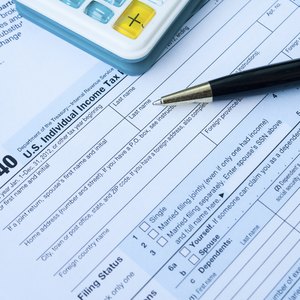
Whether or not you have to file a tax return doesn’t depend on how many months of the year you work, but rather on how much you earn in total. As far as the IRS is concerned, the only thing that matters is how much you made, not how long it took you to make it. If you only had one job and did not earn a large sum, you might not have to file a tax return, but this is not the case for everyone. Regardless if you have not been filing taxes for 10 years because you had no tax obligation, or you did not work a full year, it could still be in your best interest to file.
Tips
The IRS is concerned with how much money you made during the year, rather than the specific amount of time it took you to earn it. If you have earned more than the minimum filing amount specific by the IRS for your particular filing status and age, you are required by law to file a tax return.
Minimum Income To File taxes
For the tax year 2018, married couples filing jointly under the age of 65 have a filing threshold of $24,000. Single individuals under the age of 65 must file when their income exceeds $12,000. If they file as head of household, that minimum increases to $18,000.
Dependents and Seasonal Employment
Summer jobs are often the first employment that young people have, and figuring if they need to file a tax return is often confusing to both the workers and their parents. Often, students are claimed as dependents on their parents’ tax returns, and dependency status changes the way income is taxed.
If you’re claimed as a dependent on someone’s return, you are still required to file taxes if you earn more than the minimum income requirements set forth by the IRS annually. The minimum incomes for dependent categories for 2018 are as follows:
Earning Thresholds for Single Dependents
- Under 65 years of age and not blind – more than $6,350
- 65 years of age and older or blind – more than $7,900
- Blind and 65 years of age or older – more than $9,450
Earning Thresholds for Married Dependents
- Under 65 years of age and not blind – more than $6,350
- 65 years of age and older or blind – more than $7,600
- Blind and 65 years of age or older – more than $8,850
Because you’re claimed as a dependent by a parent or someone else, you cannot claim a personal exemption for yourself. Also, the person who claims you as a dependent cannot include your income with their own when they file their tax return.
Self-Employed Workers
Self-employed and independent contractor taxpayers must file a tax return when their net earnings from self-employment exceed $400. Before you can decide if you are required to file a tax return, you must figure out the net profit or loss from your business by subtracting your business expenses from your business income.
If your business shows a net profit of $400 or more, you must file a tax return. You may want to file a tax return even if you show a loss on your business, particularly if you have other income. You can usually deduct the loss from gross income on page 1 of Form 1040.
Unlike employees, independent contractors have to pay self-employment tax in addition to federal income taxes. This self-employment tax, known as SECA or Self-Employment Contributions Act, includes contributions to Social Security and Medicare. These payments and estimated income tax payments are typically made quarterly as the year progresses. A quick visit to the IRS Self-Employed Individuals Tax Center website provides helpful interactive tax tools, publications and other information.
Claiming Your Tax Credits
Even if you aren’t required to file based upon the minimum income thresholds, you might want to do so anyway. While you may not incur a penalty for not filing taxes if you had no obligation to do so, the IRS has several refundable tax credits designed to assist low- and middle-income wage earners in shouldering some of the rising costs of living. If your tax liability or obligation is at zero, you may still be eligible. However, if you do not file your return, you cannot claim them, and you will not receive the refund you might be owed. Also, if you had any taxes withheld from your paycheck, you won’t be able to get those back unless you file. A complete list of tax credits is available on the IRS website that can help you determine if you qualify.
References
- PayWizard: 2017 Federal Individual Income Tax Rates, Deductions and Exemptions
- Efile: Tax Return Filing Requirements for Dependents
- IRS: Self-Employed Individuals Tax Center
- IRS: Credits & Deductions for Individuals
- IRS. "Publication 501 Dependents, Standard Deduction, and Filing Information," Pages 2-5. Accessed March 20, 2020.
- Tax Foundation. "2019 Tax Brackets." Accessed March 20, 2020.
- IRS. "Filing Status," Page 7. Accessed March 20, 2020.
Writer Bio
Tara Thomas is a Los Angeles-based writer and avid world traveler. Her articles appear in various online publications, including Sapling, PocketSense, Zacks, Livestrong, Modern Mom and SF Gate. Thomas has a Bachelor of Science in marine biology from California State University, Long Beach and spent 10 years as a mortgage consultant.
